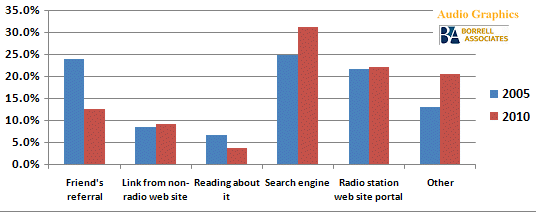 Analytics, Metrics and Music for the Radio Industry
Analytics, Metrics and Music for the Radio Industry
 An Indie Artist Pipeline to Internet Radio
An Indie Artist Pipeline to Internet Radio
 Radio Industry ROI Strategy
Radio Industry ROI Strategy
 A New Breed of Indie Artists
A New Breed of Indie Artists
2013: Year of the "Enthusiastic Amateur"
I believe we are approaching media saturation.
If we go back to earlier days (not the earliest, but in the 1950s), take a city with a population of 1 million and divide that by the number of media outlets (say: 20 radio stations, 3 television stations, and two newspapers), we end up with a dividend of 40,000 people for each outlet. (This is strictly hypothetical so I split the number evenly.)
Today, including online, that population reach is in the billions, and media outlets number in the hundreds of thousands. Throw in blogs, and that media outlet figure soars.
The variable that is not (and cannot be) included is how a person finds your program online. If you live in that 1 million person DMA, you know how to find local media. Online, there's no clue as to where each and every media outlet is. For those in the radio industry, this may be better explained by saying that calculating online "share" is impossible.
| "EA in this case means a person who wants to be a disc jockey or radio program director finally getting to run their own station." |
There are nearly unlimited entertainment/information options for audio talk or music programming, the vast majority created by "Enthusiastic Amateurs." EA in this case means a person who wants to be a disc jockey or radio program director finally getting to run their own station. The Enthusiatic Amateur is also a person on YouTube, MySpace, or any of hundreds of similar sites. As explained below, this is not always a negative. |
Live365 along with hundreds of other companies have a business model designed to serve this market. Many are profitable.
The amateur radio station world is in constant flux, with EA content created and folded daily. The EA's common string is getting satisfaction from dabbling in worlds they enjoy but know little about.
It's highly unlikely that an EA will be successful, relative to that definition in the radio industry (Justin Beiber, one exception). In the world of Enthusiastic Amateurs, though, it doesn't matter. Most are happy serving their dozens, hundreds, or thousands of followers.
The effect of this on the radio industry is in how a person listening to an audio source online cannot be listening to your broadcast station locally or online.
People working in the "professional" radio industry (which doesn't concern itself too much with all the audio options being used by those under 40) should start caring about Enthusiastic Amateurs. Here's why: The Radio EA is like a person who enjoys golf. They may hack their way through, but they enjoy the experience and are not afraid of spending a few thousand dollars a year to play the game. Cumulatively, online radio EAs draw millions of people who would otherwise be listening to local stations.
Here's a quote from an Audio Graphics article of October 29, 2009: "13,000 broadcast stations are now competing with just as many independent internet radio operations (many with dozens-to-hundreds of individual channels). By forcing a degeneration of program quality over the past decade through consolidation tactics and cutting the experienced/expensive employees, radio groups are finding that the quality of what they produce for broadcast is not much different from that found at radio stations online."
The radio industry has its Ryan Seacrest, Rush Limbaugh, and a few score of nationally syndicated or locally successful programs. But it also delivers countless hours of duplicative programming that's little more than one-song-after-another, followed by "9 commercials in a row without musical interruption." And that is why consumers are trying what the "Enthusiastic Amateur" is creating.
That YouTube delivers videos with millions of views, and that we have a long list of online radio programs produced by people with little more than a desire to turn others onto good music, shows that the public is accepting amateur produced content.
Maybe only a handful of small independent online stations deliver audiences equitable to that of a major market broadcaster, but the aggregate effect of thousands is a clear drain on the big companies.
As Audio Graphics' internet radio listener surveys show, the top three methods for people finding radio online come from search engines, a friend's referral, and radio portals. Neither offers much to the radio industry; water-cooler talk about local radio programs is greatly diminshed, radio (as an industry) never pursued search engine optimizing, and radio's only "portal" is iHeartRadio. (TuneIn exists, but is not industry supported.)
 Question: What most helps you find new Internet radio stations?
Question: What most helps you find new Internet radio stations?
The online radio audience is built more from people escaping the commercial radio experience than from curiosity on what's to be found on the Net. Now that we have an intuitive use of online, and a continuation of song-after-song voice-tracked programming over-the-air along with the exploding smart phone market, look for more movement from air to online by radio Enthusiatic Amateurs.
I'm aware of more than three products in development stage and aimed at EA radio operators, each due for introduction in 2013. For radio industry AEs, that could be problematic with the exponential growth of enthusiastic amateur content.










